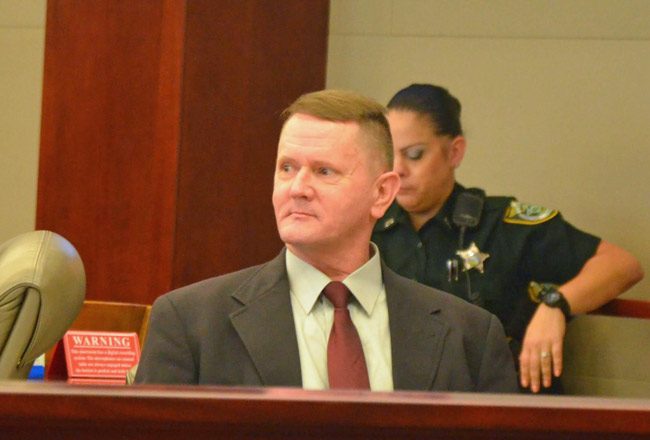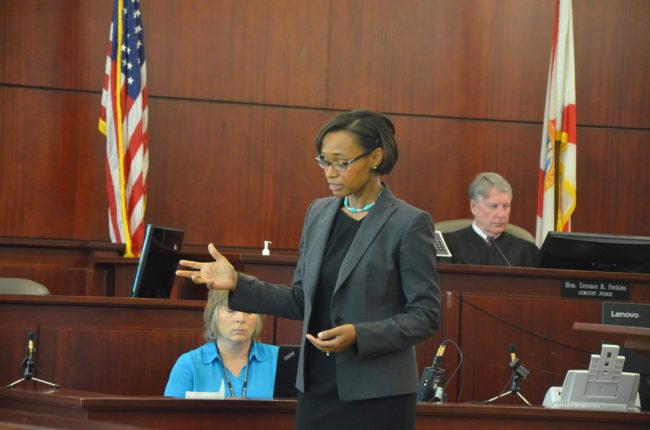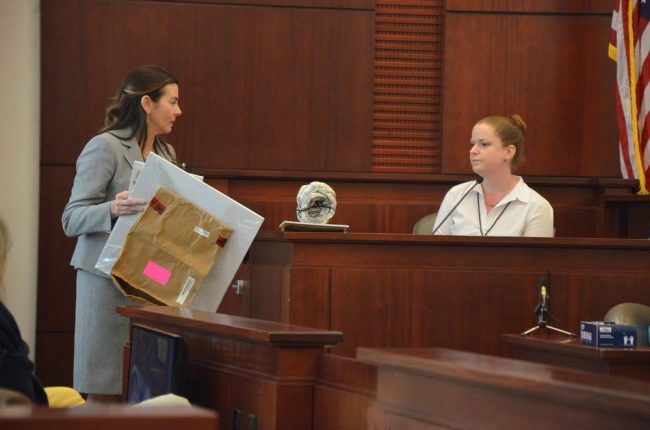
Bruce Haughton at first claimed to detectives that he remembered nothing of the day when he was found in the front seat of his car in the garage at 29 Red Clover Lane in Palm Coast, unconscious but breathing, Katherine Goddard, his girlfriend of 16 years, dead next to him of carbon monoxide poisoning.
In several conversations with detectives and with Goddard’s daughter, he said he had no idea how the duct tape had ended up around the door to the garage to seal it, how the towel was placed at the foot of the door, even how Goddard had ended up next to him. All he remembered was going to sleep in the car–napping–while listening to the radio, with the garage door open. But when Goddard was found dead, the garage door had been shut, the garage door to the house sealed, Goddard had managed to climb over him into the passenger seat (the passenger-side door was blocked and inaccessible inside the garage). Somehow, Haughton slept through it all.
“The things that I saw, it doesn’t make sense to me,” Goddard’s daughter Raquel Schleenvoigt, who found the couple in the car, told Haughton in a call he didn’t know was being recorded by law enforcement, though she never said anything that wasn’t already revealed in police reports. “Someone would have had to have planned it,” she says. “This was planned by someone.”
“Well, it was her,” he says.

There’s no question that she wanted to die. The prosecution is not contending that she did. It’s not disputing that Haughton himself may have wanted to die, and it’s not arguing that he in any way tried to kill Goddard while sparing himself: “The State does not intend on introducing any evidence or argument that on June 30, 2017, [Haughton] was not attempting to kill himself in addition to assisting Katherine Goddard in her attempt,” Assistant State Attorney Jennifer Dunton wrote in a motion filed only Monday.
Yet here was Haughton, 54, on trial this morning on a second degree felony charge of “assisted self-murder,” as Florida law, betraying its religiously-inspired discordance with the more contemporary academic literature on mental health, refers to suicide. (The term “self-murder” dates back to previous centuries when the act of taking one’s own life was itself a crime. The word “suicide” was part of the de-criminalization of the act.)
Haughton is, in other words, on trial for assisted suicide. His was not arrested on that charge until six weeks after Goddard’s death and after he’d been hospitalized to recover from his own ingestion of carbon monoxide. Goddard died more quickly because, as Predrag Bulic, the medical examiner for the circuit, testified today, she was also suffering from severe heart disease, with 80 percent blockage in one of her arteries. She could have died any day from that, Bulic said. But Haughton himself complicated the case for detectives after initially claiming he had no part in preparing the garage–in assisting in his and Goddard’s death. He would later change his story, say that he had done so but only to go along with Goddard. He would not have done it on his own. (The couple had had a normal family life until 2007 when they were in a car crash that started them on pain pills and reduced mobility. Their lives changed after that.)
Still, the prosecution is not disputing that he was trying to kill himself as much as Goddard was. So why the charge? Because he failed, turning him into a criminal for having had a hand in helping Goddard’s suicide, too.
Rose Marie Peoples and Matt Phillips, Haughton’s public defenders, are not disputing the facts as the state is presenting them. Haughton changed his story. That’s on recordings the prosecution has in hand and is still playing to the jury, with more to go on Wednesday. But Haughton in the same recording was clearly spooked about being accused of a crime when detectives first spoke to him: he repeatedly asks them whether he’s being looked at suspiciously, they repeatedly tell him he’s not. But he’d read Schleenvoigt’s Facebook post, reported on FlaglerLive three days after the suicide, saying, “We have been asked to stay away from him until the investigation is over. There are details I’m leaving out until we know for sure what exactly happened.” He told a detective that that sounded as if he was being investigated.
Schleenvoigt’s words had upset him. “This last paragraph brought me to tears because it says it’s still being investigated which means I’m still being investigated,” he told the detectives in the recorded conversation. “I see crap like that online, and God only knows what was put in Facebook,” he tells then-detective Jodie Glasgow. “why do they have to investigate? she’s dead.” She tells him not to worry.
But he was under investigation.
At several points in the recordings, Haughton becomes emotional, in one case sobbing outright after he asked where Goddard had been taken after her death. She was at the medical examiner’s office for an autopsy. When the prosecution showed a photograph of her after her death, in the car, on several large-screen monitors, Schleenvoigt, who’d remained in the courtroom after her testimony, broke down and was walked out by a victim’s advocate.
What Haughton’s attorney wanted to introduce in court was evidence of Haughton’s own history of suicide attempts or Baker Acts, when he was involuntarily committed to a psychiatric unit in Daytona Beach for talking about self-harm. There’s one such documented case: on July 22, three weeks after Goddard’s death, when he was found in the area of Ralph Carter Park, where he’d been living in the woods. He’d been homeless since Goddard’s death., trespassed from the house on Red Clover Lane. He told a deputy he’d been having suicidal thoughts for a few days. He was Baker Acted.

“It’s the defense’s position that we can’t divorce these out,” Peoples said, that it speaks to Haughton’s “ongoing state of mind.” But Perkins said that has nothing to do with assisting in the suicide of another person. “That’s what the charge is about,” Perkins said.
The defense wanted to argue that there couldn’t possibly have been an instance of “assisting” if Haughton himself wasn’t attempting to kill himself as well–that it was a mutual choice (and judging from the letter she wrote, a choice driven by Goddard). But the judge is not allowing that argument, at least not in the context of Haughton’s broader mental health issues. Nevertheless, Haughton’s revelations in conversations with the detectives did not exactly paint him as a suicidal person so much as one distraught by the loss of his companion of 16 years.
“She was tired of life,” he told the detectives in the recordings as he recovered in the hospital. “I was like, that’s not the way to handle it, there’s got to be a better way, like this situation, we could move away, if we had to live under a bridge or whatever, there’s always a way to go.”
In her opening argument to the jury this morning, Peoples said Haughton and Goddard found themselves in a place of desperation, without a third person–or anyone–who could steer them away from killing themselves. “Did Bruce unlawfully and deliberately assist Catherine in the commission of self harm? The answer is no,” Peoples said. “They were not acting alone. They were acting together.”
The trial almost ended before it started. Before opening arguments and before the jury was let in, the judge entertained discussion of a settlement. The state was willing to offer a three-year prison sentence rather than the mandatory seven years Haughton faces if found guilty, plus two years’ probation. He’s already served almost two years, awaiting trial on $100,000 bond. (He has no means to pay the bond.) Haughton was willing to put up with one more years’ jail or prison time. But he was not willing to go for the two years’ probation. The reason: he’s homeless. He would have no way of paying the costs, or, without a car, without any means at all of abiding by probation’s strict terms. He’d immediately be in violation. The judge was willing to suspend Houghton’s sentence if he was to violate his probation. Houghton and his lawyers huddled. He declined to take the offer: he does not consider himself guilty of anything but attempting to die.
The trial resumes at 9 a.m. in Courtroom 401 at the Flagler County courthouse. Closing arguments are expected in early afternoon, according to the lawyers’ estimate at the end of today’s proceedings.





























Palm Coast Citizen says
The problem is that he did work with her, so if the charge is assisted self-murder, then he is guilty of the attempt. The issue is bigger than the current law. The circumstances that preempted this attempt and the ultimate sentencing are the peripheral tragedies in this case. Prison for mental health desperation.What avenues of support availed themselves to reasonably avoid this situation, and is the punishment consistent with enacting justice in our society?